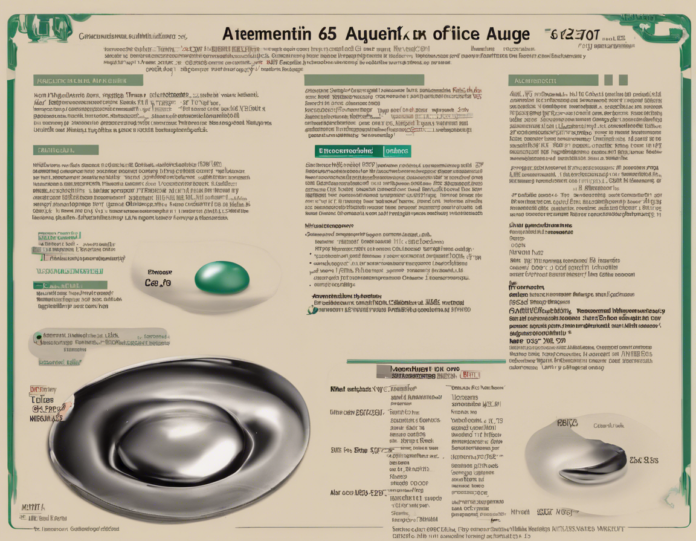Introduction
Augmentin 625 is a widely-used antibiotic medication that combines amoxicillin and clavulanic acid. This powerful combination is effective in treating a wide range of bacterial infections. In this article, we will explore the multiple benefits of Augmentin 625, how it works, its side effects, precautions to be taken, and frequently asked questions about this medication.
What is Augmentin 625?
Augmentin 625 is a brand name for a combination antibiotic medicine that contains amoxicillin and clavulanic acid. Amoxicillin belongs to the penicillin group of antibiotics and works by stopping the growth of bacteria. Clavulanic acid helps to overcome bacterial resistance by inhibiting an enzyme that breaks down amoxicillin.
Benefits of Augmentin 625
-
Broad Spectrum: Augmentin 625 is effective against a wide range of bacteria, making it a versatile antibiotic for treating various infections.
-
Sinus Infections: It is commonly prescribed for sinus infections caused by bacteria, providing relief from symptoms like nasal congestion, facial pain, and headache.
-
Respiratory Infections: Augmentin 625 is beneficial for respiratory tract infections such as pneumonia, bronchitis, and tonsillitis.
-
Urinary Tract Infections: It is also effective in treating urinary tract infections caused by bacteria.
-
Skin Infections: Augmentin 625 can help clear up skin infections, such as cellulitis and impetigo, by combating the bacteria responsible for these conditions.
-
Ear Infections: This medication is commonly used to treat ear infections, including otitis media and otitis externa.
How Does Augmentin 625 Work?
Augmentin 625 works by inhibiting the growth of bacteria and disrupting their cell walls. The amoxicillin component interferes with the formation of bacterial cell walls, leading to their weakening and eventual death. The clavulanic acid in Augmentin 625 extends the spectrum of amoxicillin by blocking enzymes that can inactivate amoxicillin. This combination makes Augmentin 625 effective against a broader range of bacteria.
Side Effects of Augmentin 625
While Augmentin 625 is generally well-tolerated, some individuals may experience side effects. Common side effects include:
– Nausea
– Vomiting
– Diarrhea
– Abdominal pain
– Skin rash
Rare but serious side effects may include:
– Severe allergic reactions
– Liver problems
– Clostridium difficile-associated diarrhea
If you experience any severe side effects, seek medical attention immediately.
Precautions to Take
-
Inform Your Doctor: Ensure to inform your healthcare provider about any allergies or medical conditions you have before taking Augmentin 625.
-
Complete the Course: Finish the entire course of antibiotics as prescribed by your healthcare provider, even if you start feeling better before the medication is finished.
-
Avoid Alcohol: It is advisable to avoid alcohol while taking Augmentin 625, as alcohol can interact with the medication and cause adverse effects.
-
Take with Food: Augmentin 625 is best taken with food to reduce the risk of stomach upset.
-
Monitor Side Effects: Keep a check on any side effects you may experience and report them to your doctor.
FAQs about Augmentin 625
1. Can I drink alcohol while taking Augmentin 625?
It is advisable to avoid alcohol while taking Augmentin 625, as it can interact with the medication and increase the risk of side effects.
2. How long does it take for Augmentin 625 to start working?
You may start to feel improvement in your symptoms within a few days of starting Augmentin 625. However, it is essential to complete the full course of antibiotics as prescribed.
3. Can Augmentin 625 be used to treat viral infections?
No, Augmentin 625 is an antibiotic that is effective against bacterial infections. It is not effective against viral infections such as the flu or common cold.
4. What should I do if I miss a dose of Augmentin 625?
If you miss a dose, take it as soon as you remember. However, if it is almost time for your next dose, skip the missed dose and continue with your regular dosing schedule. Do not take a double dose to make up for the missed one.
5. Can Augmentin 625 cause allergic reactions?
Yes, allergic reactions to Augmentin 625 can occur. If you experience symptoms like hives, swelling, difficulty breathing, or itching, seek immediate medical attention.
6. Is it safe to take Augmentin 625 during pregnancy?
It is essential to consult your healthcare provider before taking Augmentin 625 during pregnancy. They will weigh the benefits against the potential risks to you and your baby.
7. Can Augmentin 625 be given to children?
Augmentin 625 can be prescribed to children, but the dosage will be adjusted based on their weight and age. It is crucial to follow the pediatrician’s instructions carefully.
8. Are there any drug interactions with Augmentin 625?
Certain medications, such as probenecid, allopurinol, and methotrexate, can interact with Augmentin 625. Inform your doctor about all medications you are taking to avoid potential interactions.
9. How should Augmentin 625 be stored?
Store Augmentin 625 at room temperature away from moisture and heat. Keep it out of reach of children.
10. Can Augmentin 625 be taken on an empty stomach?
While Augmentin 625 can be taken with or without food, it is generally recommended to take it with food to reduce the risk of stomach upset.
In conclusion, Augmentin 625 is a potent antibiotic medication that offers multiple benefits in treating various bacterial infections. Understanding how Augmentin 625 works, its side effects, and necessary precautions can help ensure a safe and effective treatment course. If you have any concerns or questions about Augmentin 625, consult your healthcare provider for personalized guidance and advice.









